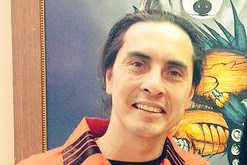Chief Arlen Dumas of Mathias Colomb Cree Nation (MCCN) in Pukatawagan, one of five candidates seeking to succeed Derek Nepinak as grand chief of the Assembly of Manitoba Chiefs (AMC), isn’t one to withhold his views on issues like whether First Nations are seeing benefits from industrial development of natural resources in their traditional territories.
“Why do we allow our governments to acquiesce to such massive benefits to industry and not provide properly for our people in this country?” he said in an interview July 13. “Why do we allow such massive multimillion benefits to corporations when you should be providing those necessities and facilitating those things for our people? I as a Canadian, I as a Manitoban, I as a First Nation person do not care if Hudbay does not give its shareholders a profit margin every year. I do not care if Vale is unable to give its profits to its shareholders but I care when our natural resources are not being used to provide houses and running water and proper schools and proper facilities to our people in Manitoba and Canada.”
Dumas, who has helped lead blockades of Hudbay’s operations in Snow Lake before, is running against Nelson House Development Corporation manager and Nisichawayasihk Cree Nation (NCN) member David Kobliski, former Wasagamack First Nation chief Sharon Mason, Dakota Plains Wahpeton Oyate member Craig Blacksmith and Lake Manitoba Treaty 2 First Nation member Garry McLean for the position of grand chief, which will be decided in an election by Manitoba First Nation chiefs July 19 during the AMC annual general assembly in NCN July 18-20.
Although he has been successful in obtaining greater benefits for MCCN during his time as chief, Dumas says his goal is to collectively better the conditions of Manitoba’s First Nations.
“In this day and age, as we celebrate 150 years why are there people still using outhouses and slop pails in Manitoba?” Dumas says. “Why are we living in these conditions? It’s because we keep acquiescing to these little appeasements that the government does. ‘OK , here we’re going to give you 10 houses a year for 20,000 people.’ Well, that’s unacceptable. With the help of my council and the strength of my community I’ve been able to negotiate almost $200 million worth of additional funding since I’ve been chief and I appreciate the fact that some of my successes are because of the fact that I’m able to advocate and that it’s also an opportunity for the federal and provincial governments to appease me so that I don’t draw attention that some of my other communities are still under intervention and are still unable to provide the same tangible results to their communities. I’m someone who will not be afraid to expose those things and bring attention to them in a meaningful and constructive way and help develop and facilitate the solutions that will need to be created.”
Dumas says Manitoba First Nations have traditionally been trailblazers whose example other First Nations follow and that his experience at a meeting in Thompson when the Idle No More movement was at its height showed him that many concerns are universal.
“When I walked into the room the majority of the people were various community members in Thompson, the majority of them had silver hair and there I was talking to a room of non-native elders who wanted to come and listen,” he said. “They were all in agreement. Why do we not have adequate old folks homes in this area? Why do we not have proper housing? Why do we not have proper health care? Sitting in that room that day everybody was in agreement. We all have the same issues. It’s just that we’re not talking about them in a wholesome way.”




